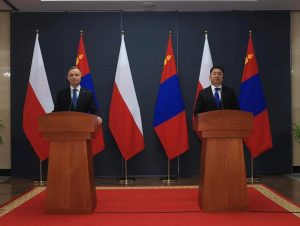Polish President Andrzej Duda paid a state visit to Mongolia from April 24 to 26. The visit has been in the works for some time; during his visit to Mongolia in 2022, Zbigniew Rau, the rotating chairman of the Organization for Security and Cooperation in Europe and Polish foreign minister, stated that the Polish president’s visit has been planned for a long time.
Marcin Przydach, head of the International Policy Department of the Polish Presidential Office, emphasized that although Mongolia and Poland are geographically distant, both countries have important geographical and geopolitical positions.
During his visit, the Polish president praised Mongolia’s democracy and highlighted the role Mongolia could play in resolving the ongoing conflict in Ukraine. “Poland has for years observed and appreciated Mongolia’s efforts not only to build democracy in the internal arena but to ensure peace and security in the world,” Duda said.
Mongolia and Poland have had diplomatic relations for over 70 years. The total trade volume between the two countries is approximately $100 million. The majority of bilateral trade consists of wool and cashmere, knitted products, fruits and vegetables, consumer goods, and construction materials. Most of these goods are generally imported from Poland.
Overall, regardless of the remote impact of geography, cooperation between the two countries in many fields such as politics, education, culture, and humanitarianism is successfully developing. Poland has expressed its interest in jointly building a copper smelter and a fossil fuel power station, which is much needed in Mongolia.
The Organization for Security Cooperation in Europe, which counts both Poland and Mongolia as members, also enriches their bilateral ties. The OSCE is one of the largest regional organizations with a total of 57 member countries in Europe, the Americas, and Asia.
In 2004, Mongolia became the fifth Asian country to cooperate with the OSCE. After nearly a decade worth of efforts, Mongolia became a full member state in November 2012 – the first OSCE member located in East Asia.
The secretary general of the OSCE visited Mongolia in 2006 and 2012, meeting with heads of state, government, and some ministers, which promoted cooperation with the OSCE. Members of Mongolia’s parliament regularly participate in meetings of the OSCE Parliamentary Assembly, while representatives of Mongolia regularly participate in branch meetings and training sessions.
Since February 2022, the conflict between Russia and Ukraine has become a cause of grave concern for the OSCE generally, and particularly for Poland, which borders Ukraine. The OSCE and many European countries have called on its member states to unite and overcome difficulties.
In 2022, as part of Europe’s diplomatic push linked to the Russia-Ukraine conflict, many ministers and representatives from European countries visited Mongolia. During his visit, Polish Foreign Minister and 2022 OSCE Chairman-in-Office Zbigniew Rau emphasized the importance of OSCE cooperation in Mongolia-Poland and Mongolia-OSCE relations.
During his own visit, Duda suggested that Mongolia and Poland face additional threats due to Russia’s invasion. Both countries know from experience what a world based on the use of force, rather than rule of law, looks like, he said. “At all costs, we cannot allow a return to that.”
In the future, Mongolian President Khurelsukh Ukhnaa may visit Poland or other European countries to continue the recent flurry of Mongolia-Europe diplomacy. If so, Khurelsukh may also be interested in visiting Ukraine.
Since the Russian invasion began, more than 50 world leaders have visited Ukraine. Due to this crisis, it is currently difficult to travel to Ukraine by plane. All these leaders have traveled to Ukraine by train via Poland, and the Polish side is responsible for all security issues entering Ukraine. Duda has visited the war-stricken Ukraine region four times in the past. During his recent visit, the Polish president may have shared his experience and knowledge of the situation on the ground in Ukraine with Khurelsukh.
In addition, Khurelsukh gained experience visiting conflict areas during his tenure as prime minister from 2017 to 2021. In 2019, he visited South Sudan, which was experiencing civil war, and had exchanges with Mongolian peacekeeping personnel. It should also be emphasized that after the conflict began, Mongolia’s former President Elbegdorj Tsakhia has visited Ukraine multiple times.
Mongolia is a country that values peace and prosperity. In the past, Ulaanbaatar has attempted to serve as a mediator between the conflicting parties in other crises – for example, hosting talks in Ulaanbaatar to resolve the Korean Peninsula crisis. Although playing the role of mediator in peace and ceasefire negotiations is not the highest priority goal in Mongolia’s foreign policy, the current situation of the Russia-Ukraine conflict highlights the importance of Mongolia’s potential participation in the relevant mediation work.
The political elite of Mongolia have private relationships in both Russia and Ukraine. Among the four presidents of Mongolia who have studied abroad, two received education in present-day Russia, and the other two received education in Ukraine (Elbegdorj at the Lviv Higher Military and Political School, and Bagabandi at the Odessa National Institute of Food Technology). In addition, many elites who received education in these areas during the former Soviet Union continued to express their concerns about the crisis in Ukraine.
Ukrainian President Vladimir Zelenskyy himself has a personal connection to Mongolia: He lived with his parents in the industrial city of Erdenet in northern Mongolia for about four years when he was child. On February 21, at the request of Zelenskyy, Khurelsukh had a phone conversation with the Ukrainian president. This indicates that Mongolia, which has friendly relations with all parties involved in the conflict, may hold some form of peaceful ceasefire negotiations in Ulaanbaatar.
Neighboring China also proposed 12 points for a peaceful ceasefire in February, and Chinese President Xi Jinping indicated further action toward this end in his recent phone call with Zelenskyy. Perhaps Mongolia will also communicate with China on this matter in the future.

































